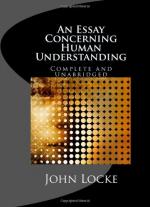
|
| Name: _________________________ | Period: ___________________ |
This quiz consists of 5 multiple choice and 5 short answer questions through Book I.
Multiple Choice Questions
1. What does Locke say we do with ideas?
(a) Aspire to them.
(b) Doubt and hate.
(c) Name and organize them.
(d) Eat and digest them.
2. Where does Locke say ideas come from?
(a) Inspiration.
(b) Experience.
(c) Senses.
(d) God.
3. To what does Locke attribute the ability to create technology and to organize our environment?
(a) Reason.
(b) Science.
(c) Sensitivity.
(d) Perception.
4. What does Locke say about this standard for whether an idea is innate?
(a) He says that it is too wide a net.
(b) He says that it is a kettle of fish.
(c) He says that it is too high a hurdle to pass.
(d) He says it is a bird of a different color.
5. Where does understanding originate, according to Locke?
(a) The genes.
(b) The collective unconscious.
(c) The senses.
(d) God.
Short Answer Questions
1. What does Locke say about sensations that an infant feels in utero?
2. What does Locke say about the knowledge of how property rules should be established?
3. How does Locke describe the work principles do?
4. What is the limitation of understanding, according to Locke?
5. Which concept was beyond the sphere of Locke's inquiry?
|
This section contains 282 words (approx. 1 page at 300 words per page) |

|




